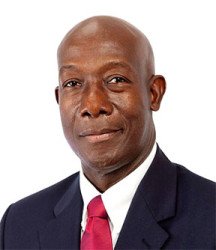(Trinidad Guardian) The former People’s Partnership government spent TT$250 million on travel.

This was revealed by Prime Minister Keith Rowley while speaking at the PNM’s post-budget national public meeting at Piggott’s Corner, Belmont Circular Road, Belmont, on Friday night.
Rowley said, “It’s important for government members to travel because we do have business outside T&T.
“So ministers will have to travel from time to time but we believe that travel ought not to be a perk and a junket.
“It ought to be done only when necessary because it is very expensive.
“Would you believe the government that just went out of office, guess how much money the ministries, I’m not talking about state enterprises, the Judiciary, the ombudsman, just the ministries, the executive, the government spent on travel in the last five years?
“Two hundred and fifty million dollars.”
Taking a jibe at former prime minister Kamla Persad-Bissessar, he said the people of T&T received savings on the night of September 7, the minute the PNM got the majority vote and he became Prime Minister, because he started saving on a hairdresser and a powder man travelling with him.
Rowley said it was one thing to say that government travel was important and necessary, but when the Ministry of Foreign Affairs spent $30 million on travel, the question to ask was where were they going and for what purpose.
He said the Government would be looking at ways to cut out waste and corruption in the public sector, such as state enterprises leasing hundreds of motor vehicles.
Rowley said instructions were made through Cabinet that all government vehicles, barring specific national security and state vehicles, must carry the insignia of the agencies that were leasing vehicles and the instruction would go out to every permanent secretary.
He also said there was to be no purchase of any vehicle dedicated to any minister and no minister’s driver was to drive any public vehicle because it was a cost to tax payers.
On the issue of mass transit, Rowley said the Inter-American Development Bank (IDB) was invited to come to Trinidad to look at the situation with the eyes of independent experts.
He said when the IDB gave its report with recommendations, the Government would then decide how it was going to treat with the need for a mass transit system of whatever kind in T&T.
Rowley said the PNM started off with a rail system, but the former government undermined and scrapped it.
He said the Government would not green light the project until it got the IDB’s report and after holding consultations with the people before taking a decision.
Finance Minister Colm Imbert, meanwhile, said when the PNM left office the public debt was TT$45 billion, compared to the UNC’s TT$77 billion.
He said the former government not only used up all the cash reserves in the Central Bank, it also maxed out the country’s borrowing limit.
Imbert said there were projects that needed to be funded.
Among these are a new port in Port-of-Spain; converting the Beetham dump into an industrial estate; building a highway to Manzanilla, a road to Toco, and a new ferry port; converting the whole Waterfront area to housing, recreation and entertainment; a better road to Chaguanas; and a ringroad around Chaguanas. He said he intended to include a mass transit system as well.
Stuart Young, minister in the Office of the Attorney General, said the Government intended to implement several pieces of legislation and initiatives to ensure proper and efficient management for T&T. These include a revenue authority, local government reform to be passed before the next constitutionally due local government elections next year, public procurement legislation, whistleblowing legislation by December, reforming the process for appointing a Commissioner of Police, the International Finance Centre, and resuscitating cyber crime legislation.





